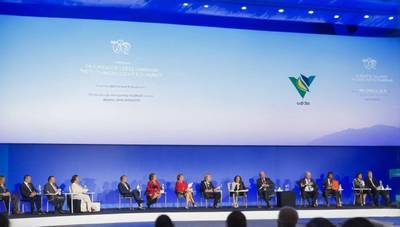Takeaways from COP30 Climate Summit in Brazil
The U.N. Climate Change Summit ended this year with a shaky compromise that ignored most of the countries' main demands, except for one: wealthy countries were obligated to triple their expenditures to help other countries adapt to global warming. Here are some key takeaways from COP30, the climate summit that took place in Brazil's Amazonian city of Belem.
HOOKED UP TO HYDROCARBONES Luiz Inacio Lula, the President of Brazil, had called on countries to adopt a "roadmap" to move forward with a COP28 commitment to abandon fossil fuels.
The summit was doomed to failure, however, because oil-rich Arab countries and other nations dependent on fossil fuels obstructed any discussion of the topic. The COP30 presidency instead created a voluntary climate plan, which countries could either sign up for or reject. It was similar to Egypt’s COP27 or Azerbaijan’s COP29 where countries agreed to spend money on climate threats while ignoring the primary cause. Since 2020, coal, oil and natural gas have accounted for nearly three-fourths (73%) of global greenhouse gas emissions. The International Energy Agency stated in a mid-COP30 report that the demand for these fuels will likely rise until 2050. This is contrary to expectations of a rapid transition to clean energy.
On the brink of global climate unity, countries have agreed on the need to demonstrate global unity during climate talks. They also agreed that the wealthy and polluting countries should be doing the most to combat the problem.
To reach a final agreement, they had to abandon nearly all of their ambitions - including the mandatory tightening of targets to reduce climate warming emissions. Brazil's COP30 presidency lamented the United States' snubbing the talks. The absence of world's largest economy, and the biggest historical polluter, emboldened fossil fuel-interested countries. The rumblings of concern about a system that only allows a select few to effectively veto any collective agreements grew louder and fueled calls for reform. Brazil promised a COP of Truth that would put countries on a course of action. However, there were no agreed implementation plans.
CHINA IN POLE POSITION China was a major player at the summit, but it did so from the background.
As is his custom, President Xi Jinping did not attend the meetings. His delegation sent a clear message that China is ready to provide the clean energy technologies the world needs in order to reduce emissions.
The first thing delegates see when they enter the vast venue is the Chinese exhibit pavilion, which features executives from solar, battery and electric vehicles companies. This year, China wasn't the only nation that was in focus. India's delegation showed more strength in negotiations while South Africa presented a climate agenda for their own G20 summit on November 22-23.
FRAUGHT FORESTS AND INDIAGENOUS RIGHTS
Brazil held the summit in a city located within an Amazon forest, highlighting the importance of the remaining canopy of trees for combating climate change. It also highlighted the half-billion Indigenous People who are seen as the stewards to the natural land. Many of the attendees from the Amazon and around the world were frustrated that they weren't heard. The protesters staged multiple demonstrations and stormed the COP30 gates, clashing with security until they were pushed out. About $9.5 billion was announced in forest funding, including nearly $7 billion for Brazil’s flagship tropical fund and $2.5 billion to support an initiative in Congo. The summit ended in a disappointing note for many as negotiators abandoned efforts to create a roadmap for meeting the zero-deforestation promise by 2030 and refused to acknowledge the protection of their land.
ASSASSINS ON CLIMATE RESEARCH While Lula, and other world leaders, had denounced misinformation and denial in the past year, the COP30 discussions did not do much to counter this year's U.S. Government assault on climate research. The summit further undermined the global consensus on climate science, by not recognizing the U.N. Intergovernmental Panel on Climate Change (IPCC) as the "best science available" for guiding policy on climate changes and their impacts. The final agreement instead notes the importance IPCC outputs, along with "those from developing countries and relevant report from regional groups and organizations." By ignoring fossil fuels, and ignoring emission targets, COP30 dismissed the alarms that scientists were raising. (Reporting and editing by Ros Russell.)
(source: Reuters)


